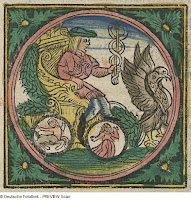WINGED WORDS WINDSDAY
Compiled by Rob Chappell (@RHCLambengolmo)
Vol. 1, No. 22: March 30, 2022
Celebrating Women’s History Month
Episode #5: The Nine Muses, Plus One
Excerpt from The Age of Fable (Chapter 1) by Thomas
Bulfinch (1796-1867)
The Muses were the daughters of
Jupiter and Mnemosyne (Memory). They presided over song, and prompted the
memory. They were nine in number, to each of whom was assigned the presidence
over some particular department of literature, art, or science. Calliope was
the muse of epic poetry, Clio of history, Euterpe of lyric poetry, Melpomene of
tragedy, Terpsichore of choral dance and song, Erato of love poetry, Polyhymnia
of sacred poetry, Urania of astronomy, Thalia of comedy.
Apollo and the Muses on Mount
Helicon (1680) by Claude Lorrain. (Image Credit: Public Domain via Wikimedia
Commons)
Orphic Hymn #75: “To the Muses”
Translated by Thomas Taylor (1758-1835)
Daughters of
Jove, dire-sounding and divine,
Renowned
Pierian, sweetly speaking Nine;
To those
whose breasts your sacred furies fire
Much-formed,
the objects of supreme desire:
Sources of
blameless virtue to mankind,
Who form to
excellence the youthful mind;
Who nurse
the soul, and give her to descry
The paths of
right with Reason's steady eye.
Commanding
queens who lead to sacred light
The
intellect refined from Error's night;
And to
mankind each holy rite disclose,
For mystic
knowledge from your nature flows.
Clio, and
Erato, who charms the sight,
With thee
Euterpe ministering delight:
Thalia
flourishing, Polyhymnia famed,
Melpomene
from skill in music named:
Terpischore,
Urania heavenly bright,
With thee
who gavest me to behold the light.
Come,
venerable, various, powers divine,
With favoring
aspect on your mystics shine;
Bring
glorious, ardent, lovely, famed desire,
And warm my
bosom with your sacred fire.
Proclus (410-485 CE): “Hymn to the Muses”
Translated by Thomas Taylor (1758-1835)
A sacred
light I sing, which leads on high
Jove's nine
famed daughters, ruler of the sky,
Whose
splendors beaming o'er this sea of life,
On souls
hard struggling with its storms of strife,
Through
mystic rites perfective and refined,
(From books
which stimulate the sluggish mind)
From Earth's
dire evils leads them to that shore,
Where grief
and labor can infest no more;
And well
instructs them how, with ardent wing,
From Lethe's
deep, wide-spreading flood to spring,
And how once
more their kindred stars to gain,
And ancient
seats in truth's immortal plain,
From whence
they wandering fell, through mad desire
Of matter's
regions and allotments dire.
In me this
rage repress, illustrious Nine!
And fill my mental
eye with light divine.
Oh may the
doctrines of the wise inspire
My soul with
sacred Bacchanalian fire,
Lest men,
with filthy piety replete,
From paths
of beauteous light divert my feet.
Conduct my
erring soul to sacred light,
From wandering
generation's stormy night:
Wise through
your volumes hence, the task be mine,
To sing in
praise of eloquence divine,
Whose
soothing power can charm the troubled soul,
And
throbbing anguish and despair control.
Hear,
splendid goddesses, of bounteous mind,
To whom the
helm of wisdom is assigned,
And who the
soul with all-attractive flame
Lead to the
blest immortals whence she came,
From night
profound enabling her to rise,
Forsake dull
Earth, and gain her native skies,
And with
unclouded splendor fill the mind,
By rites
ineffable of hymns refined.
Hear, mighty
saviors! and with holy light,
While
reading works divine illume my sight,
And
dissipate these mists, that I may learn
Immortal
gods from mortals to discern;
Lest,
plunged in drowsy Lethe's black abyss,
Some baneful
daemon keep my soul from bliss;
And lest
deep merged in Hyle's stormy mire,
Her powers
reluctant suffer tortures dire,
And some
chill Fury with her freezing chain,
In lingering
lethargy my life detain.
All-radiant
governors of wisdom's light,
To me now
hastening from the realms of night,
And ardent
panting for the coast of day,
Through
sacred rites benignant point the way,
And mystic
knowledge of my view disclose,
Anne Bradstreet (1612-1672): “The Tenth Muse Lately Sprung up in
America”
The first published poet in
British North America was Anne Bradstreet (1612-1672), a learned resident of
Massachusetts whose poetry earned her the nickname of “The Tenth Muse.” Her
poems cover a wide range of subjects, such as everyday life in Colonial New
England, history, biography, and science. Here is an example of her scientific
poetry, a didactic piece on the four elements of ancient Greek science – earth,
water, air, and fire.
A depiction of Anne Bradstreet
from 1898 by Edmund H. Garrett. (Image Credit: Public Domain via Wikimedia
Commons)
“The Four Elements”
By Anne Bradstreet (1612-1672)
The Fire,
Air, Earth and water did contest
Which was
the strongest, noblest and the best,
Who was of
greatest use and might'est force;
In placide
Terms they thought now to discourse,
That in due
order each her turn should speak;
But enmity
this amity did break
All would be
chief, and all scorn'd to be under
Whence
issu'd winds & rains, lightning & thunder
The quaking
earth did groan, the Sky lookt black
The Fire,
the forced Air, in sunder crack;
The sea did
threat the heav'ns, the heavn's the earth,
All looked
like a Chaos or new birth:
Fire broyled
Earth, & scorched Earth it choaked
Both by
their darings, water so provoked
That roaring
in it came, and with its source
Soon made
the Combatants abate their force
The rumbling
hissing, puffing was so great
The worlds
confusion, it did seem to threat
Till gentle
Air, Contention so abated
That betwixt
hot and cold, she arbitrated
The others
difference, being less did cease
All storms
now laid, and they in perfect peace
That Fire
should first begin, the rest consent,
The noblest
and most active Element.






.png)